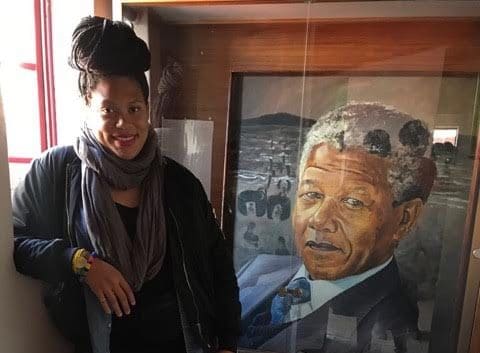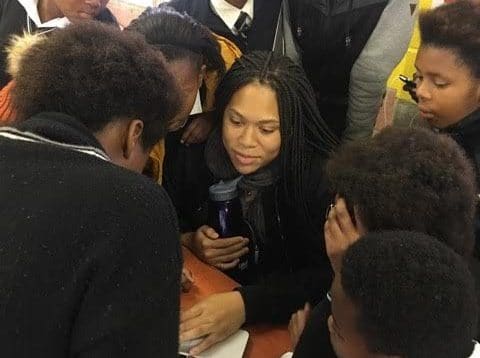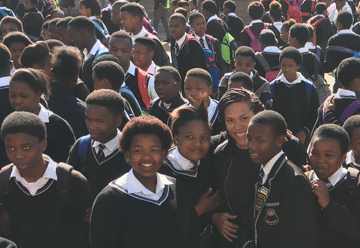
The Fulbright English Teaching Assistantship (ETA) places recent college graduates and young professionals from the United States in classrooms around the world to facilitate English teaching. The one-year fellowship, which has opportunities in over 70 countries, is designed to foster intercultural understanding and communication through an immersive cultural experience. In addition to their teaching roles, ETAs serve as ambassadors for the U.S., sharing their culture and forming relationships with residents of their host country.
We talked to Chante Mayers-Barbot, a 2017 Fulbright ETA in Port Elizabeth, South Africa, to learn more about the program and get some application tips.
1. What inspired you to apply for the Fulbright ETA in South Africa?
During the spring semester of my junior year, I studied abroad at the University of Cape Town (UCT) and wholeheartedly enjoyed my experience. I volunteered in numerous townships, tutored students in primary and secondary schools, and spearheaded community development projects. My interest and love for the country flourished during my time in South Africa. Near the end of my semester abroad, I desired to return as soon as possible to teach at a school somewhere in South Africa.
The first time I heard about the Fulbright Program was when I randomly met two Fulbrighters at the Old Biscuit Mill, a farmers market in Cape Town. Instantly I was inspired by the idea of living abroad for about a year and teaching. This was perfect, and exactly what I wanted to do. The Fulbright program would allow me the opportunity to teach, learn, and grow both personally and professionally while putting my passion into action. Wanting to learn more about South Africa’s multifaceted history, my previous experience living there and my ambition inspired me to truly exemplify my vested interest in being an agent of change in South Africa, the country I wanted to call home for the year 2017. I was sold on the idea of applying for a Fulbright!
A couple of weeks into the first semester of senior year, I visited my Fulbright Program Adviser and frantically explained that I wanted to apply for a Fulbright ETA to South Africa. I knew that Fulbright was super competitive and a prestigious award, but that did not deter me, even though I had only about a month to craft the best application that I could. In my essays, I emphasized that I overcame obstacles and worked hard throughout undergrad, not only to create opportunities for myself but also to inspire others. I made it my duty to put forth the best application that I could to receive a prestigious Fulbright Award and defy stereotypes associated with my identity as an African American first-generation college student from (the not so nice part of) Brooklyn, NY. My Fulbright Program Advisers and academic advisor consistently worked with me, regardless of how many essay drafts it took or how times I randomly popped up in their office. I am extremely appreciative.

2. What were some of the most eye-opening moments during your fellowship?
Located in the oldest township in Port Elizabeth (PE), South Africa, Walmer High School was my home away from home. Principal Dyani, Deputy Principal Mali, and the faculty welcomed me with open arms and also planned excursions to show me around PE! Living in and exploring PE was incredible and every day was unique. There was always something interesting happening at Walmer High, such as Seth Mazibuko (the youngest member of the South African Students’ Organisation that planned and led the Soweto uprising that began on June 16, 1976) giving a breathtaking speech inspiring the learners during Assembly, to trying umphokoqo with amasi also known as African Salad (a traditional Xhosa dish) with the principal, or having a former NASA scientist discuss astronomy and space science with our matrics (grade 12 learners).
As a Fulbright ETA, my responsibilities included assisting teachers, creating after-school programs, reaching out to businesses and individuals for sponsorships/grants and basically helping out wherever I could. Every day after the lunch bell rang, my Active8 learners usually stormed into the Umthombo Wolwazi library to use the laptops and also teach me their mother tongue Xhosa. Active8 was one of the various projects my co-teacher and I spearheaded. It was an intensive English reading and writing after school program for grade 8 learners. As the college application season began, I assisted my grade 12 learners with their college applications, bursary forms, and made several trips to Nelson Mandela Bay University to submit and hand in any learners’ missing documents. I also met weekly to discuss an array of topics with my girls’ empowerment group, Sister2Sister, and in between sessions, they also sang and flexed their amazing vocals.
One of my most challenging but rewarding projects I embarked on was fundraising and obtaining resources to fix Walmer High School’s plumbing system, which restored access and use to all of the student bathrooms that were in disrepair and nonfunctional. During Black History Month in February, it was important for me to not only discuss and celebrate African American history and culture but to create a fusion between South Africa and the United States, celebrating black South Africans and the African Diaspora. We created posters and learned about prominent figures of the diaspora, one of my favorite moments during my Fulbright.
It was amazing having a new place to call home, exchanging stories, and creating memories with the incredible people I met in South Africa. Fulbright gave me the opportunity to not only impact my learners, school, and community but also provided me the opportunity and funding to travel and learn about other countries and cultures on the continent of Africa, first hand, gaining a multicultural experience like no other! From visiting Robben Island, going on a safari, ziplining for the first time, interacting with my students, and everything else in between, my time in South Africa was nothing short of spectacular. My Fulbright fellowship was rewarding, challenging, and transformative all in one.

3. What tips would you give others applying to the Fulbright ETA in South Africa?
A few tips that I would give to others applying to be a Fulbright ETA in South Africa are to utilize your resources, have multiple people read and re-read your essays, and get meaningful recommendations from recommenders who know you and can speak to your abilities!
Utilize the Fulbright Program Advisers at your university. They want students from their university to be awarded a Fulbright and are there to help you with your application. Being receptive to constructive criticism is also vital. Take their advice and continue to reread, revise, and have multiple people read your work. Mentors and academic advisors are also important individuals that can guide you during the process and give you feedback on your essays.
When it comes to recommendations letters, ask those who know you best. An individual’s title (ex. A CEO of a company you interned for and rarely interacted with) isn’t as important as how well your recommender knows you (ex. a professor or advisor might be a good choice). Remember they have to write a thorough recommendation and speak to your abilities to teach and be a successful ETA, so they have to know you well. Maybe you’ve heard this one a thousand times before, but it’s so true!
In your essay, emphasize your commitment to teaching (this can be a leadership role that shows your ability to manage a classroom and lead instruction such as tutoring experience, e-board membership, or peer counseling), your experience abroad (having cultural competence and ability to adapt to different cultures), and the reason you deserve this award (why should they select you out of hundreds of applicants). These are all important components that will make your application stand out. Don’t forget to connect your background, experience, and skills to your ability to succeed as an English Teaching Assistant and Cultural Ambassador in South Africa.
In hindsight, my love for learning, cultural competence, and excitement for wanting to be an ETA in South Africa was exemplified through my writing and definitely made me stand out amongst other applicants. Give thought to what you would do with the opportunity as an ETA, specify your ideas, and make it cohesive.
Put your best foot forward and trust the process!
Chante Mayers-Barbot graduated Magna Cum Laude from the University at Albany with a B.A. in Sociology. She extended her passion for service during her semester abroad at the University of Cape Town in South Africa, spearheading a number of community development projects. Following her undergraduate career, Chante was an English Teaching Assistant (ETA) and Cultural Ambassador in South Africa at Walmer High School in 2017. She then returned to her hometown of Brooklyn, NY and worked with two non-profit organizations focused on Youth Development and Education. In the summer of 2018, Chante lived in Germany as a fellow for an international organization focused on human rights issues. Currently, Chante is a Graduate Assistant at George Washington University pursuing a Master’s degree in Public Policy.
Interested in applying? Bookmark Fulbright English Teaching Assistantship (ETA) your ProFellow account.
© Victoria Johnson 2019, all rights reserved.